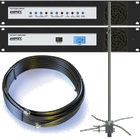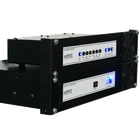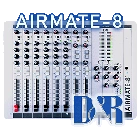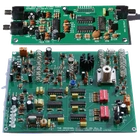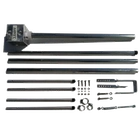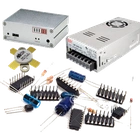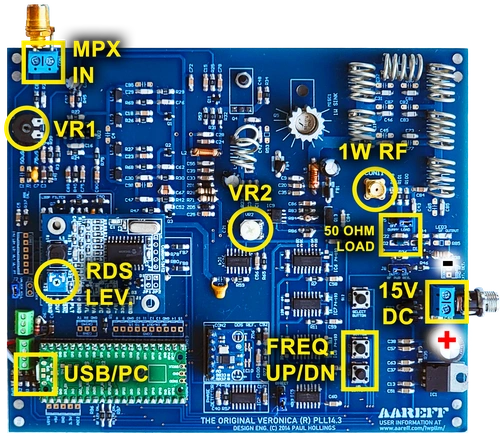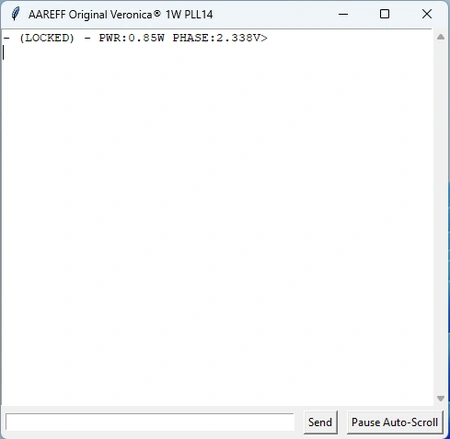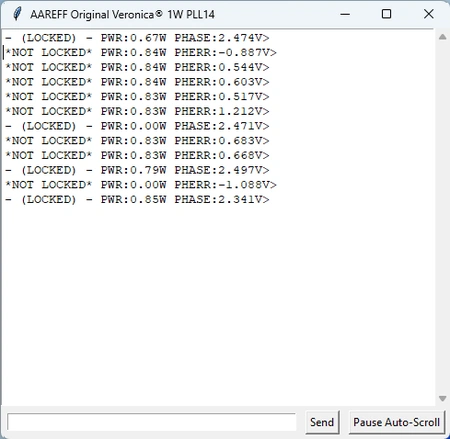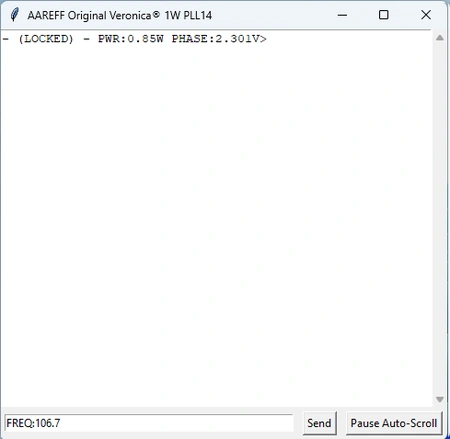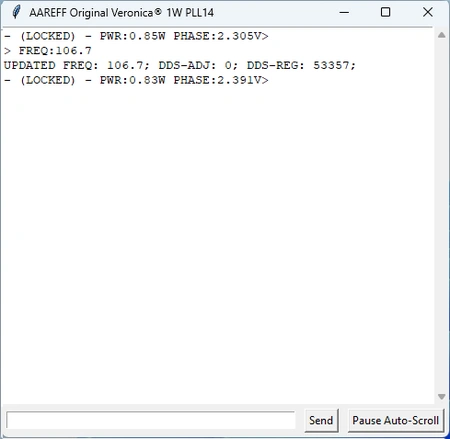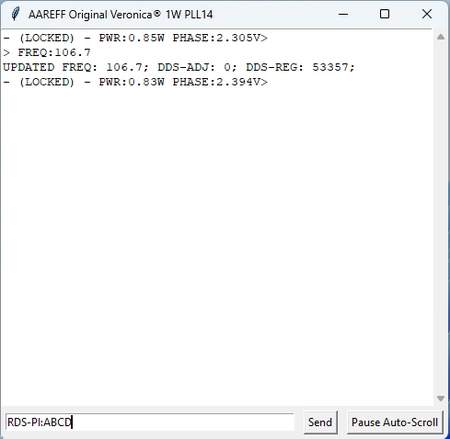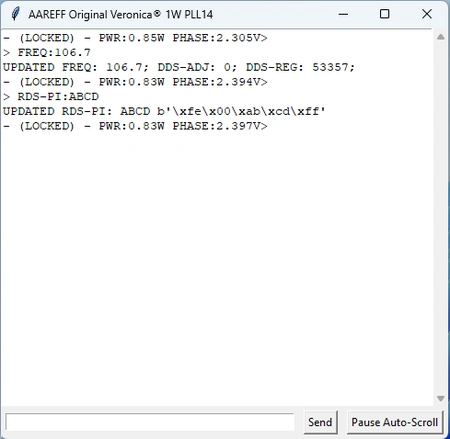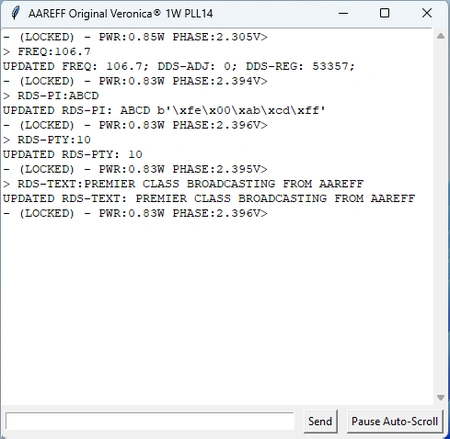 +1 829 698 0733
What Do You Need? Talk To Us
+1 829 698 0733
What Do You Need? Talk To Us
8am-4pm EST/NY Monday-Friday
info@aareff.com 
Original Veronica® 1W DDS PLL FM Transmitter Exciter / (Version 14)
If you want that FM exciter that rivals and sounds even better than the biggest commercial stations, the Veronica PLL has to be your first choice. High precision frequency control using DDS with a slow speed PLL ensures the highest quality audio and MPX.

|
5 YEARS
LIMITED WARRANTY
MORE INFORMATION
|
- DDS REFERENCED PLL
- LOW NOISE BETTER THAN -80dBu
- FLAT 20Hz-76KHz MPX INPUT FOR AGGRESSIVE AUDIO PROCESSORS
- EXCEEDS CE/FCC TECHNICAL SPECIFICATION
- HIGH VSWR PROTECTED
- BUILT-IN 50 OHM DUMMY LOAD
- DYNAMIC RDS OPTION
- REMOTE PC USB CONTROL
DDS Referenced PLL
Direct Digital Synthesis (DDS) offers excellent frequency precision and agility, but a drawback rarely mentioned by other manufacturers is the significant spurious signals and noise it produces at higher frequencies, especially as the sample rate nears the Nyquist limit. However, at lower frequencies, where the sample rate is much higher than the output frequency, DDS delivers exceptionally clean and accurate signals. We leverage this by generating a clean low-frequency DDS signal and then upconverting it to VHF using a traditional low-noise PLL (exceeding 80dBu). This approach results in a pure and stable VHF Voltage Controlled Oscillator (VCO) output while retaining the precision and agility of DDS—combining the strengths of both technologies.
Low Noise! Better Than -80dBFS
Due to the combined DDS and PLL a unweighted noise level better than -80dBFS is achieved. When you take into account the weighting from de-emphasis, the noise level is better than a 16 bit system, such as CD etc at over 90dBFS. The VCO has three varicaps, one for broadband tuning 84 to 112, another for the PLL correction voltage and a final one exclusively for the FM modulation. The modulation varicap is centered exactly at the optimum voltage for maximum audio linearity achieving better than 60dB/0.1 % IMD from 30 to 76 KHz.
Flat 30Hz to 76KHz MPX Input
We have this version available for Users with experience that prefer straight raw MPX input.
Low frequency audio response is the holy grail for multiband audio processors, they need it.
As you can see from the image, the 160Hz square wave is very square with no tilting making it perfect for use with Orban, Inovonics, Omnia, Stereo Tool and other commercial audio processors.
This setup uses a Hartley-based, lightly coupled push-push VCO that exhibits extraordinary stability, to the point where it deviates by less than 10 kHz from its designated frequency on its own, even when the DSS and PLL are switched off.
-500.webp)
Because this VCO is so inherently steady, the PLL only has to make minor corrections to maintain the frequency within about 300 Hz, effectively just giving it a slight nudge. Consequently, the audio remains very clean, as noted previously, and the PLL’s control voltage can be heavily low-pass filtered to just a few hertz. Such a slow loop filter ensures that low frequencies around 30 Hz are not misread as frequency drift, passing unaltered to the varicap. This preserves the essential low-end audio response needed for high-performance audio processors.
Exceeds CE/FCC Technical Specification
If this module is used inside a transmitter enclosure that is properly EMC screened to good engineering practice, it can and will exceed all the technical specifications demanded by the the EU CE and FCC regulations. Please check our page Compliance with Regulatory Standards.
High VSWR Protected
The RF output transistor in the 1 W unit is an SD1127 rated at 4 watts, in this unit it only runs at 1 watt. Given that it is four times overrated in power it can handle 100% reflection at any phase angle without burning out and still be within it's safe working limits. Basically the output stage will not break which is a requirement for CE marking.
Built-In 50 Ohm Dummy Load
This board can be powered and used on delivery, it is plug and play. The built in dummy load absorbs the 100mW or 1 watt power and converts 99% of it it heat. The remaining 1% of power is residual radiation from the board and components and can be heard on a radio receiver usually up to 10 ft/3mt away. This can be useful for checking that the board is working before installing it in an enclosure
Dynamic RDS Option
The small RDS sub-board can be purchased as an option. This simply plugs into the sil socket on the main board. The RDS is fully programmable with the ability to change the PI, PTY, PS and scrolling text. If it is connected permanently to a PC via USB, the text can be updated on a regular and dynamic basis showing such things as the station name, the presenter or even the song artist and title currently playing.
The onboard RDS signal is mixed with the incoming MPX signal that can be from an external audio processor or STL. Providing the input MPX signal does not contain a 57KHz signal, then the onboard RDS will mix perfectly with the audio MPX.
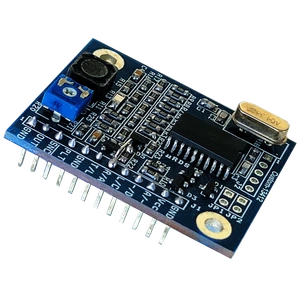
Remote PC USB Control
You can download the app free from our website that connects to the exciter via USB.
Run the app on your PC and plug your PC USB into the USB connection on the PLL DDS microprocessor board. It is 'plug and play' you don't need any special drivers. The app should connect automatically to the DDS PLL exciter and start displaying the lock status. You change the frequency, power and other parameters from the PC interface.
If you choose the optional RDS board, you can also change the PI, PTY and scrolling text.
Do You Have A Question?
USER MANUAL
Previous Versions:
PLL10
PLL11
PLL12
INTENDED USE / LEGAL ADVICE
This product is not intended for use on a 'stand alone' basis, it is
sold as spare part/module sub assembly and is intended as a component for use in a fully assembled transmitter and/or transmission system that as a whole complies with the engineering requirements of ETS 300 384 and ETS 300 447. Use of this product on a 'stand alone' basis will in most countries of the world contravene the EMC compatibility regulations. It is the customer's
responsibility to check relevant laws, directives and regulations before putting this product into service with an antenna system. You, the customer agree to defend, indemnify and hold harmless Aareff Systems Limited, it's employees and agents, from and against any claims, actions or demands, including without limitation legal and accounting fees, alleging or resulting from improper or unlawful use of this product.
PCB ASSEMBLED
MPX IN - 10K ohm 775mV Nom. 30Hz-76KHz
VR1 - MPX Deviation. 10K ohm 775mV Nom.
VR2 - RF Power Lev. 10mW to 1000mW.
RDS LEV. - RDS Deviation. 0 to 5KHz
USB/PC - USB cable connection to PC
FREQ UP/DN - Freq. Adj. in steps of 100KHz
15V DC - 15V DC power input 600mA max.
1W RF - 50 OHM RF Output
50 OHM LOAD - Dummy Load Jumper
CIRCUIT TESTING
1. Plug in a 50 ohm dummy load to the RF output OR Reduce the power to zero by turning VR2 fully clockwise.
DO NOT EXCEED 16V DC
DO NOT CONNECT + and - THE WRONG WAY
2. Apply between 12 and 16 volts to the PCB position marked CON6 +15V (+) and 0V (-)
3. Press the UP and DOWN buttons to select the frequency you require.
6. Apply audio at line level to CON1. Adjust the VR1 for correct FM deviation.
7. Remove the 50 ohm dummy load from the output OR Increase the power to full by turning VR2 fully. You are now ready to install the 1W PLL into your transmission system.
If the 1 watt PLL is connected to a Veronica / Aareff Limiter Compressor or a Stereo Coder, pre-emphasis is not required. To disable the pre-emphasis, do not select 50uS or 75uS and remove the jumper completely. Store the jumper in a safe place just in case you need to restore the pre-emph for another application at a later date.
USB PC/RDS CONTROL
Download our free PC app that connects 'plug and play' to the transmitter / PLL DDS exciter via USB. You can see the PLL status and change the frequency and power directly from the PC interface. If you choose to add the optional RDS card, you can also change the PI, PTY and scrolling text of the radio from the interface.
Below are the download links for Windows:
https://www.aareff.com/1wpllm/pll14.4/pll14.exe
https://www.aareff.com/1wpllm/pll14.4/pll14.zip
By clicking on these links, Windows may show you a warning that the software is from an unknown publisher. We assure you that we wrote the apps and the files are perfectly safe, virus-free and come from our registered domain www.aareff.com, which you can verify at https://lookup.icann.org/en/lookup
Normal state when the device is connected: the PLL is LOCKED with an output power of 0.85W and a PLL phase of 2.33V
![Original Veronica® 1W DDS PLL FM Exciter USB PC Control - Device Status]()
This shows what happens if the device loses its lock. We simulated a failure by placing our fingers on the oscillator coils.
![Original Veronica® 1W DDS PLL FM Exciter USB PC Control - NOT LOCKED]()
This shows the return to normal with the user command FREQ:106.7 typed in the input box below. A value between 87.5 and 108.0 MHz can be set.
![Original Veronica® 1W DDS PLL FM Exciter USB PC Control - Changing Frequency]()
After pressing 'Send:' the display returns UPDATED FREQ 106.7 along with other technical information. This causes the transmitter to change frequency.
![Original Veronica® 1W DDS PLL FM Exciter USB PC Control - Frequency Change Confirmed]()
This shows another command, RDS-PI:ABCD typed for devices with the RDS card.
![Original Veronica® 1W DDS PLL FM Exciter USB PC Control - Changing RDS PI]()
After pressing 'Send': the display returns UPDATED RDS-PI:ABCD instantly updating the RDS PI code.
![Original Veronica® 1W DDS PLL FM Exciter USB PC Control - RDS PI Change Confirmed]()
This shows two additional examples of RDS commands:
RDS-TEXT:[write your message here]
RDS-PTY:[number from 0 to 31]
Text is plain ASCII up to 60 chars and valid PTY Codes shown below.
![Original Veronica® 1W DDS PLL FM Exciter USB PC Control - RDS Text and PTY Example]()
SPECIFICATIONS
The following tests were taken at 15V DC and the worst case measurement was recorded
over the range -20 to +50 deg C.
| Frequency | 87.5 - 108 MHz |
| RF Output | 1W to 1.4W into 50 Ohm |
| Deviation Sensitivity Stability | +/-2% max |
| Spurious Emissions | 75dB rtc |
| Harmonic Emissions | 63dB rtc |
| Out of Lock RF Muting | 63dB rtc |
| Freq Stability | +/- 1 KHz max typ. +/-300Hz |
| RF Output Connector | Female N type |
| Audio Input Sensitivity | 0dBu for +/- 75 KHz |
| Signal To Noise Ratio | 80 dBu |
| Audio Response | Flat from 30Hz-76KHz |
| Pre-emphasis | (50uS/ 75uS/ None) |
| Audio Distortion | Better than 0.1% / 60dB THD |
| Audio Input | Unbalanced Terminal Block |
| Power Supply | 12-15V DC 650mA max |

DECLARATION OF CONFORMITY
AAREFF TRANSMISSION SYSTEMS SL
AVDA ANDALUCIA 1
LA ALFOQUIA-ZURGENA
04661
ALMERIA
ESPANA.
Paul Hollings
In Zurgena, Almería, Spain on 01 of November 2011, the equipment:
Original and Genuine Veronica 1W PLL (1WPLLM) meets the essential requirements of the R&TTE directive
ETS 300 384/A1 ed.1 (1997-2002) Broadcasting Systems Transmitters FM sound broadcasting in very high frequency (VHF)
It should be noted that this cannot be legally used as a standalone unit. This sub assembly is designed and intended to be installed in a fully screened EMC enclosure with or without other sub assemblies. Any final design should be further tested to verify it meets the essential requirements of:
EN 301 489-11 V1.3.1 (2006-05) Electromagnetic compatibility and Radio Spectrum Matters (EMC) for radio equipment and services. Part 11: Specific conditions for transmitting the terrestrial sound broadcasting service.
2006/95/EC DIRECTIVE 2006/95/EC of 12 December 2006 on electrical equipment designed for use within certain voltage limits.
ROHS
All components used in this apparatus are RoHS compliant and do not contain above the specified limits in any of the following restricted substances:
- Lead
- Hexavalent Chromium
- Mercury
- Cadmium
- Polybrominated Biphenyls (PBB's)
- Polybrominated Diphenylethers (PBDE's)
PRODUCT END OF LIFE
This apparatus must NOT be disposed of with other domestic waste.
We are fully committed to maintaining our responsibilities to the environment. Owners of apparatus that has reached the end of it's useful life can return it to us for recycling, recondition, reuse or proper disposal. You will be required to pay lowest cost postal service available to ship the apparatus to us. Before shipping please contact us for more important information.
© 2023 AAREFF SYSTEMS LIMITED
ALL RIGHTS RESERVED. Aareff is a trademark of Aareff Transmission Systems. All contents of this document including, but not limited to the images, logos, text, illustrations are protected by copyrights, trademarks and other intellectual property rights which are owned and controlled by Aareff Transmission Systems or by other parties that have licensed their material to Aareff Transmission Systems. This document in part or whole may not be copied, reproduced, republished, uploaded, posted or distributed in any way, including by e-mail, ftp or any other electronic means
Every care has been taken in the preparation of this document, errors in content, typographical or otherwise, may have occurred. If you have comments concerning its accuracy, please contact Aareff Systems Limited (UK)

-500.webp)

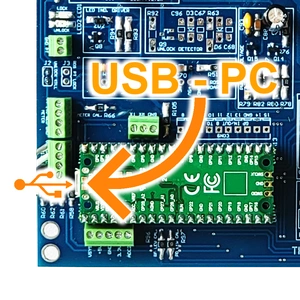

 +1 829 698 0733
What Do You Need? Talk To Us
+1 829 698 0733
What Do You Need? Talk To Us
